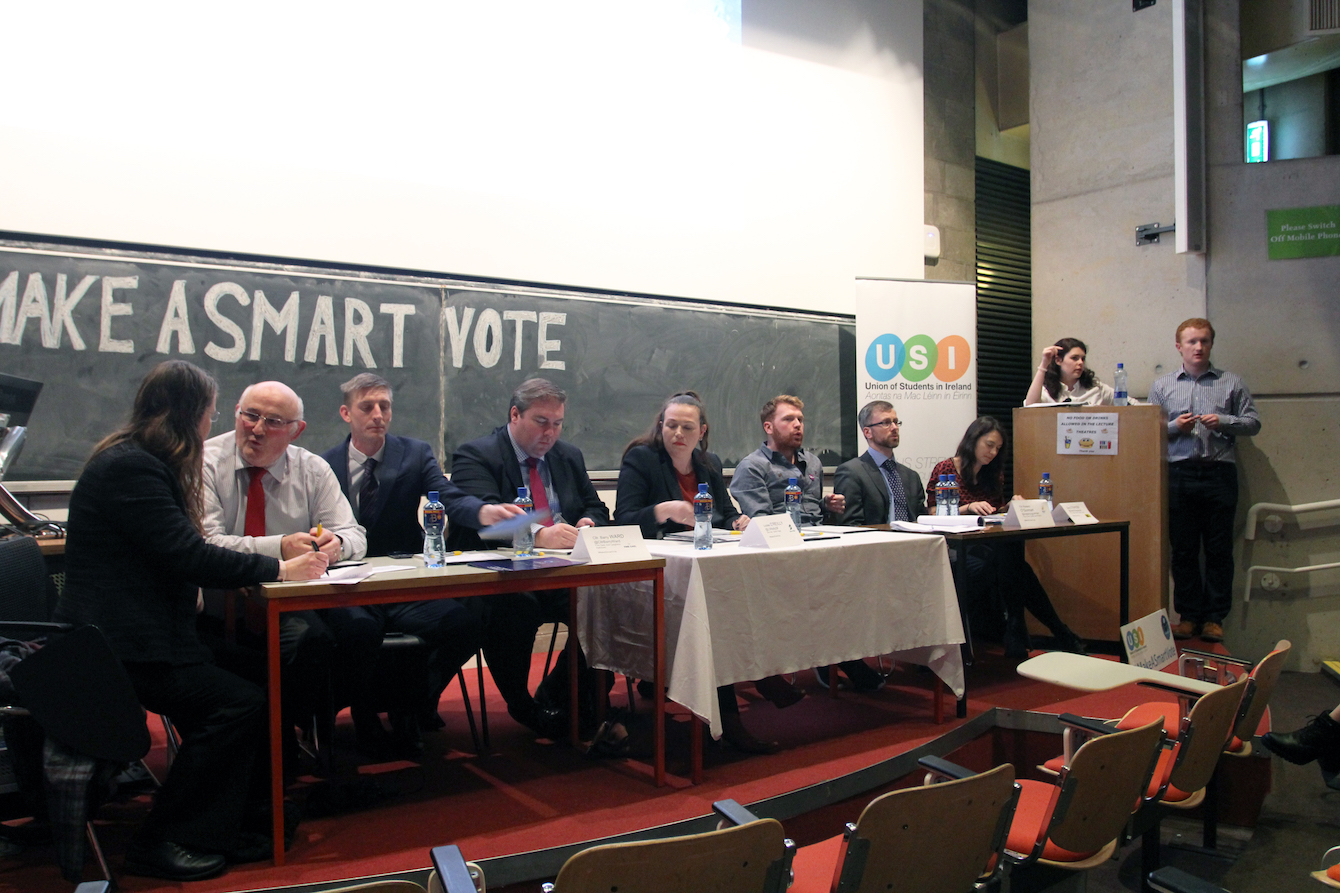
Funding
Following a brief introduction by SmartVote co-founder Keith Moore about the success of the app, each panelist made a two minute opening statement about what their party or grouping hope to achieve if elected to government when it comes to the funding of education.
Labour TD Tuffy, who is chair of the Oireachtas Committee on Education and Social Protection, spoke first and criticised some of the “misleading” newspaper and media reports surrounding the Cassells report, remarking that such reports “are not useful”. She said the group from her understanding is considering a range of options, including a fully funded exchequer system which would be her preference.
Following Tuffy DDI’s Cormac McKay bluntly opened with his assertion that students were “shafted” during the last election. He drew the audience’s memory back to the promise signed by Ruairi Quinn during the last election not to raise tuition fees, the first of many references to that infamous event.
Gerard Craughwell while not running in the general election seemed to be on the panel as a kind of agitator, encouraging students to look at who they vote before they vote and criticising plans for technical universities, saying that not everyone is suited to the type of course provided by a level eight qualification.
Fine Gael councillor Barry Ward countered Craughwell by stating that technical universities would give their students the same level of prestige that one would get in a university when studying a level eight. He said that universities as they exist don’t provide something for everyone, remarking that “not everyone needs to study English literature”.
Louise O’Reilly from Sinn Fein stated that she is the mother of a third level student, and had experience working in the department of education and in that sector. Again she made reference to the Labour pledge on fees, saying “the fact is that the labour party made a pledge to students, they broke that – you all saw – at the front of this college”.
Fianna Fail’s Charlie McConalogue spoke about the need to start refunding higher education and his party’s desire to reintroduce maintenance for postgraduate students.
Gary Gannon from the Social Democrats contested earlier remarks that free-fees hadn’t helped everyone, borrowing Ward’s contribution and adding that anyone who wants to student English literature can. Gannon said that the SocDems had a desire to build on access programmes, of which he said Trinity “is a pioneer”.
Green Party justice spokesperson Roderic O’Gorman warned against parties that make too many promises, while the AAA’s Diana O’Dwyer echoed Tuffy’s earlier comments that the current student fee of three thousand euro is unaffordable for many, but added that the attacks on students had been “disgraceful”.
International students
Sheila Power from the Irish Council of International Students was in the audience, and asked a question to the panel. She wanted to know what they all thought was the place of international education in Ireland, and what the role of government should be in supporting internationalisation.
She also highlighted many complaints received by those who she represents about the reception they receive at the airport and the Garda National Immigration Bureau, asking whether the immigration service is fit for service.
Gerard Craughwell asked why Trinity has no visa office and said that facilities like these should be available for students in colleges, and proposed increasing access to educational material to those overseas, even if it upsets university lecturers.
McKay told how how he saw in Berlin the low cost solutions to housing that they had implemented, which took the shape of shipping containers converted into accommodation, saying that it is very cheap for students.
AAA’s O’Dwyer criticised the situation where years spent in education does not count towards obtaining citizenship, and that on a whole international students are a positive thing.
Louise O’Reilly asserted her belief that international students are exploited and seen as a source of income, and directly highlighted the inequality in access to education that faces people living in direct provision.
The regulation of language schools was also highlighted as an area that required attention.
Barry Ward spoke of a need of practical solutions, saying everything comes back to funding but also talking of his experience of knowing of children who were born here but are not treated as citizens as something which needs to be addressed.
Gary Gannon also took up the issue of direct provision, and said that student activists like the ones in Trinity cannot be silent on the issue. McConalogue also agreed of the need for language schools to be examined more closely.
Aside from the Social Democrats, no other parties have released their manifestos with panelists keen to stress that they could not reveal what they would contain as they knew as little about them as the general public.






